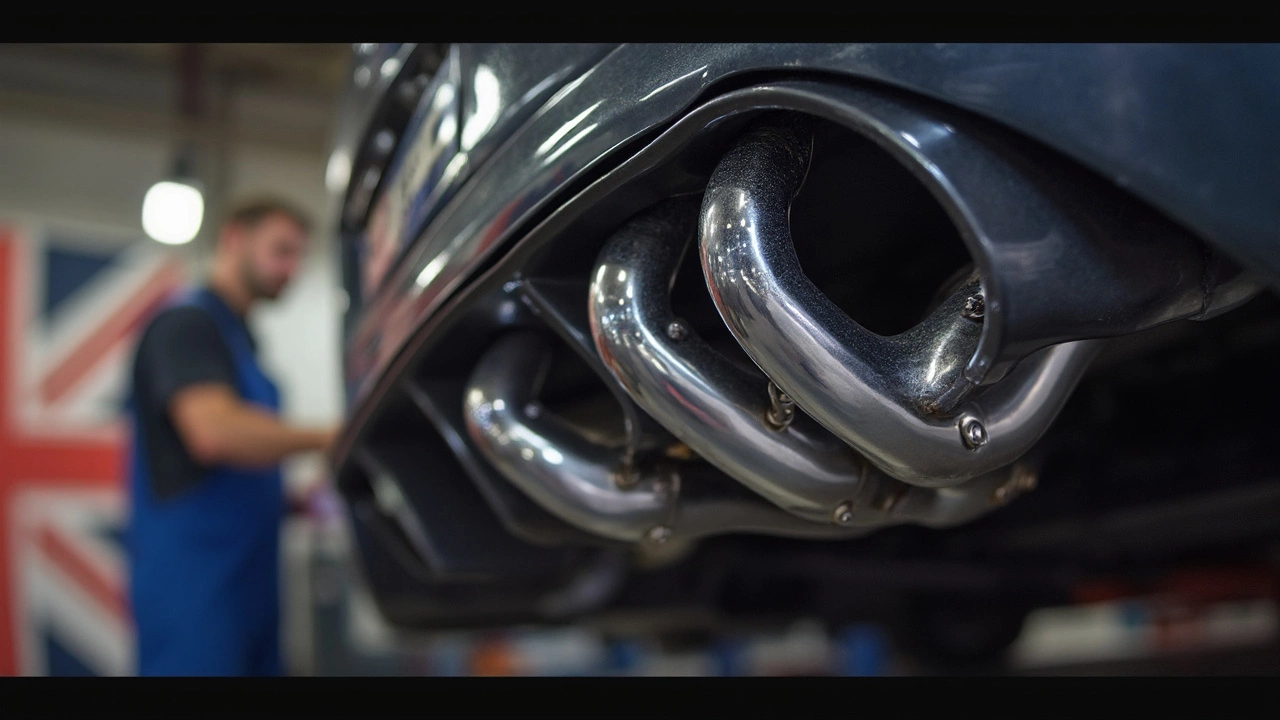Buying a full exhaust system for your car can feel like venturing into a maze. Let's face it, prices can be all over the map, depending on what you're driving and what you want out of the system. Who knew your car's purr could be such a complex equation, right? But hang in there, we're going to unravel this together.
First off, what's driving the cost, you ask? Name a factor, and it's probably in the mix. The make and model of your car are biggies. If you're tooling around in something like a classic muscle car, expect to shell out more than if you've got a standard sedan. Oh, and let's not forget the material. Different metals, like stainless steel or mild steel, come with their own price tags and pros and cons.
We'll also chat about installation. Some folks like to roll up their sleeves and do it themselves, but let's be real, not everyone is built for that kind of labor. Sure, you might save a buck or two, but sometimes it’s worth getting a pro’s touch, especially if you're after that sweet spot of performance and sound. What’s more, weighing aftermarket options might just save you money while boosting performance.
- Factors Affecting Exhaust System Cost
- Benefits of Upgrading Your Exhaust System
- DIY vs. Professional Installation
- Performance and Sound Improvements
Factors Affecting Exhaust System Cost
Alright, so why do exhaust systems cost so differently? Well, strap in, because a few main factors come into play. Let's break them down so it's easier to decide what's worth shelling out for.
First on the list is the vehicle make and model. Not every car is cut from the same cloth. A full exhaust system for a basic compact car will likely cost less than a system designed for a luxury or performance vehicle. Why? It's about complexity and demand. A Ferrari's components aren't really interchangeable with those of a Corolla.
Then there's the material choice, and this could be the real kicker. Stainless steel is popular because it’s resistant to corrosion and lasts longer. On the other hand, there's mild steel, which is a bit cheaper but might rust faster. And don’t forget about aluminized steel, which is like the middle child here—cheaper than stainless, more durable than mild.
Now, think about aftermarket versus OEM (original equipment manufacturer) parts. OEM parts are what your car came with, and they're usually more costly. Aftermarket options often provide a more economical and sometimes performance-boosting choice.
Finally, we have the exhaust system configuration. Are you going for a cat-back, axle-back, or a complete system? A cat-back setup replaces everything from the catalytic converter back and is popular for performance upgrades. But opting for a full system that includes headers, mid-pipe, and mufflers? That’s the whole shebang, and it will cost more.
Look, it always helps to eyeball a few quotes and maybe even compare prices at several shops. Just like you’d shop around for a TV, do the same for your exhaust system to get the best bang for your buck.
Benefits of Upgrading Your Exhaust System
When it comes to upgrading your exhaust system, it’s not just about making your car sound like a beast. There's a whole lot of practical benefits that many car owners might not even consider at first.
One of the biggest advantages is the boost in performance. A quality exhaust system can help your engine breathe better, and when your engine breathes easier, it works more efficiently. This usually means more horsepower and torque. In simple terms, it can make your ride feel zippier.
You also have the matter of fuel efficiency. Who doesn't want to save some bucks at the pump? A new exhaust system can improve the flow of exhaust gases, reducing back pressure and making your engine run smoother. This could lead to better miles per gallon. It's like a win-win: you're not just getting better performance but also keeping more cash in your pocket.
Sound is another massive factor. Some folks love the aggressive roar of a powerful car, while others appreciate a more subtle hum. Upgrading gives you the power to choose exactly how you want your vehicle to sound.
Let’s not forget aesthetics. Sleek, shiny pipes can seriously up the cool factor of your ride. It’s like giving your car a makeover with the bonus of performance perks.
Last but not least, durability plays a crucial role. Many aftermarket exhaust systems are made from stainless steel, which can resist corrosion better than the original equipment. This means longer-lasting parts, which can potentially save you money over time.
So, whether you're all about speed, looking to save on fuel, or just want your car to look and sound great, there's a whole world of benefits waiting with that exhaust system upgrade.

DIY vs. Professional Installation
Thinking about swapping out your car's full exhaust system all by yourself? It's a tempting thought for sure! The sheer thrill of turning the wrenches, not to mention saving some cash, can be award-worthy. But let's be honest, it's not all sunshine and rainbows.
If you're a DIY guru and have a penchant for tackling car projects, you might feel right at home under the hood. But don't forget the reality check: this job can be tricky. Without the right tools, lifting the car, or understanding the exhaust system's intricacies, an exhaust installation can quickly turn into a stressful endeavor.
- Time commitment: DIY installation isn't an hour-long thing. Expect to spend several hours, especially if it's your first time.
- Tools required: Socket sets, jacks, jack stands, and maybe even a saw for cutting the old system out.
- Difficulty level: Medium to high, depending on your vehicle type and the condition of the current system.
On the flip side, you have the professionals. These guys do this day in and day out, and there’s something to be said for experience and expertise. Sure, it's going to cost more upfront, but that expense can save headaches and potentially costly mistakes down the road. Plus, most shops offer warranties on their work, which is a neat safety net if something doesn’t sound right after installation.
Here's a quick comparison:
| Factor | DIY | Professional |
|---|---|---|
| Cost | Lower initially, but tools could add up | Higher, but often includes warranty |
| Time | Variable; can take a full day for novices | Efficient; usually done within hours |
| Skill Level | Requires prior mechanical experience | Expertise with specialized equipment |
So when deciding between DIY and hiring a pro for your exhaust system, think about your comfort level with car repairs, the tools you have at hand, and whether you value speed and reliability over cost. Sometimes a little help from the experts goes a long way!
Performance and Sound Improvements
Upgrading your exhaust system is like hitting the refresh button on your car's performance and letting it sing with a more powerful voice. It’s not just about noise, though; there’s some real magic going on under there. Let’s break it down.
First, let's talk power. A well-designed exhaust system helps your engine breathe better. This can lead to more horsepower as gases exit more efficiently. You could see gains of about 5-10% in power, all without lifting the hood or busting open your engine.
The sound is what usually gets people amped up. Switching out your exhaust can transform your car's hum to a full-on growl. Whether you want a deep rumble or a louder roar, there are systems tailored for each. But, remember to keep it legal! Each area has laws about noise levels, so double-check to dodge any fines.
If you want numbers, consider this: a decent aftermarket system, often in the $500-$2,000 range, could drop your 0-60 time by a second or more. Costing much less than some other mods, it's a solid way to up your car’s game without draining your wallet.
But what about fuel economy? Surprisingly, as exhaust efficiency improves, so can your mileage. It's not a night-and-day change, but you'll see modest savings when you’re not flooring it like a race car driver.
| Modification | Average Power Gain (%) | Estimated Cost ($) |
|---|---|---|
| Basic Exhaust Upgrade | 5 | 500-1,000 |
| Performance Exhaust System | 10 | 1,000-2,000 |
The bottom line? A new exhaust system shouldn't just be a dream; it’s a smart, practical upgrade. Who knew getting a little louder could be this beneficial in so many ways?

